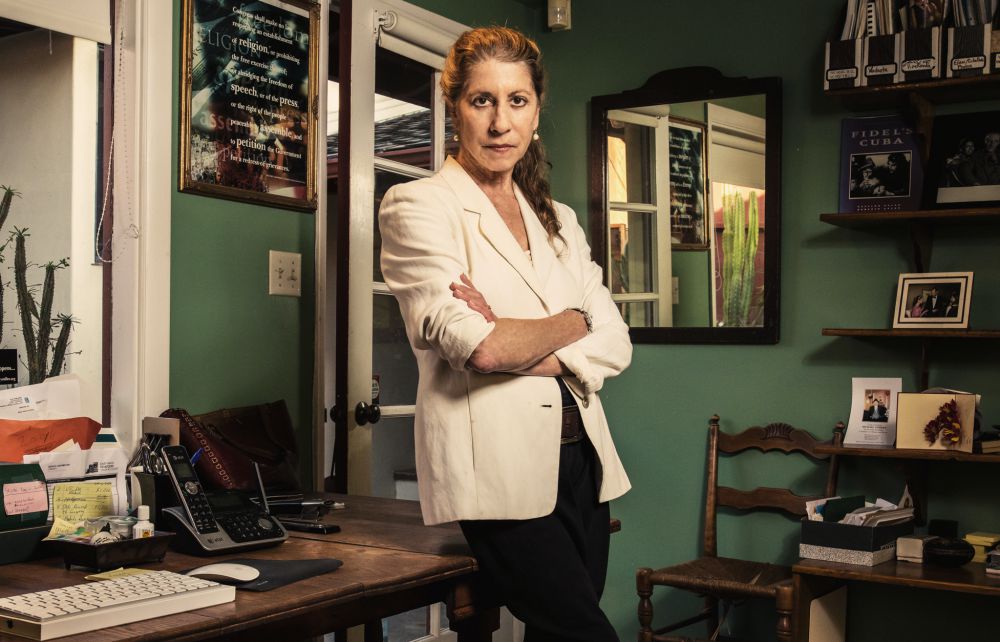
An Enduring Gift
Let’s just stipulate Ann Louise Bardach had reach. The award-winning American journalist wrote about such disparate characters as Fidel Castro, Sid Vicious, JonBenet Ramsey, Larry Rivers, William Burroughs and Benazir Bhutto.
Many of Bardach’s experiences are reflected in her lifetime career research files, which document her eclectic and deeply reported journalism from 1979 to 2018, and in the five books she authored or edited. UC Santa Barbara Library’s Department of Special Research Collections holds it all.
The collection includes a vast array of research materials, correspondence, scores of photographs by several acclaimed photographers, state and federal files, financial records, handwritten notes and personal letters, interview transcripts, articles and audio recordings of interviews with many of her well-known subjects.
Donated in 2018, the archive continues to resonate with filmmakers, journalists, scholars and the public.
Coming Up
HBO is airing an original documentary featuring Bardach, “537 Votes,” which examines the chaotic voter recount in Florida during the 2000 presidential showdown of Bush vs. Gore. As “the go-to journalist on all things Cuban and Miami,” according to the Columbia Journalism Review, Bardach discusses how and why the Elián González custody battle was pivotal to the end result.
Additionally, one of the creators and producers of the Showtime television series “Homeland” is co-writing a new TV series based on Bardach’s five-part New York Times feature on Luis Posada Carriles, Cuban exile militant. A former Central Intelligence Agency asset, Posada was Fidel Castro’s would-be assassin in a career spanning a half-century.
Archives Run Deep
Notably, the UCSB Library has acquired all of her materials related to the U.S. government’s case and trial of the anti-Castro militant, including those that were subpoenaed by the FBI and the Department of Justice. Posada’s handwritten notes and the audio of his three days of interviews with Bardach that were the basis for the New York Times series are now available for research.
In addition to Posada, Bardach has extracted damning admissions from an array of political and cultural figures, including The Sex Pistols’ Johnny Rotten to Watergate burglar E. Howard Hunt.
“Annie’s collection is an incredibly valuable research tool and is widely used, especially in the area of U.S. and Cuba relations,” said Danelle Moon, director of UCSB Library Special Research Collections. “Her collection is a perfect example of how archives can have an indefinite impact on future scholarship.”
Bardach has covered an unusually eclectic range of political and cultural issues, making the collection as diverse as her own life and career.
“Because I was more of a general assignment reporter — prior to my dive into Cuban politics — what the library now has of mine,” she said, “is just about the kitchen sink of journalism, from the Manson murders, Punks, Beats, then the Cuban-Miami wars and some general Latin America.”
Some of the major subjects and people covered in the collection include the life and trials of Miami’s epic-exile leader, Jorge Mas Canosa, Cuba-United States relations, Fidel Castro and his family, the Ramsey murder, Arnold Schwarzenegger and numerous political figures, and high-profile murder cases such as Bobby Beausoleil, the first Manson case.
Notable Accolades
Bardach has frequently been seen and heard on television and radio, including several appearances on “60 Minutes” and “The Today Show,” as well as on NPR. She has written for virtually all the major media in the U.S. and the U.K. — including the New York Times, Washington Post, POLITICO and the Los Angeles Times — after a decade-long stint at Vanity Fair magazine.
In 1995, Bardach won the PEN USA Award for Journalism for her reporting on Mexican politics and was a finalist in 1994 for her coverage of women in Islamic countries. Her book “Cuba Confidential” was a finalist for the New York Public Library Helen Bernstein Award for Excellence in Journalism and the PEN USA Award for Best Non-fiction, and named one of “Ten Best Books” of 2002 by the Los Angeles Times.
Bardach was a finalist for the 1993 PEN Award for her investigation into Europe’s homegrown Islamic Fundamentalism for Vanity Fair. In 2005, she was again a finalist on several lists for her deep dive into Gov. Arnold Schwarzenegger’s ties with the tabloid press, published in Los Angeles magazine. The late dean of American journalism, Tom Wolfe, gushed over Bardach’s second book on Cuba, “Without Fidel: A Death Foretold in Miami, Washington and Havana,” describing it as “news between hardcovers by a relentless reporter who writes like a dream.”
Campus Connections
Bardach has had a long relationship with UCSB. She started teaching the campus’s first Global Journalism course; served as a board member for the Carsey-Wolf Center for Film, Television and New Media; and was a resident scholar with the Orfalea Center for Global and International Studies.
Bardach was introduced to Special Research Collections at the UC Santa Barbara Library by her friend Lou Cannon, a Ronald Reagan biographer whose papers are also held there. He urged her to consider donating her own files and introduced her to the library’s patron, Sara Miller McCune. After a fire threatened to destroy her life’s work, Bardach migrated her archives to the Library.
Collections like Bardach’s detail the methodology of investigatory journalism and shed a singular light on the exhaustive legwork and process of investigative reporting. Her papers and ephemera are a glimpse into the backstories that shape our understanding of politics, history and culture. They are a perfect example, Moon said, of how Special Research Collections can be a critical portal to understanding all sides of the story.



